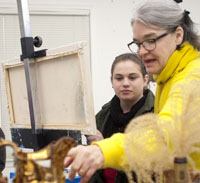Leaving a Legacy

Elizabeth "Punky" Jane Smith ’72
Elizabeth "Punky" Jane Smith ’72 was always looking for one more way she could help her alma mater. A lifelong supporter, Smith was highly engaged with the College, providing both financial support and her time as a volunteer.
"She certainly thought very highly of the College," said Smith's brother, Joe Smith. "We worked on her estate plan together, and that's when I really came to know how much it meant to her. She made lifelong friends and her semester in Reading was extremely meaningful to her and something she remembered her whole life."
Though she passed away in 2016, Smith's legacy lives on. One of her most unique contributions to the College came in the form of pecans. More than 35 years ago, she and other members of the Nashville chapter of the R-MWC Alumnae and Randolph College Alumni Association decided to hold a pecan sale to provide funding benefiting the Middle Tennessee Scholarship Fund at Randolph. The popular event has provided $200,000 in financial support for 47 students from the Middle Tennessee area.
The pecan sale was just one way Smith supported the College. She was a member of the Quillian Society and made gifts to the Annual Fund for 45 consecutive years. She also shared from her estate generous support for infrastructure improvements, faculty development through the Mary Ethel Whitener Smith and Henry Clay Smith, Jr. Fund (in memory of her parents), and a commitment to Randolph's Innovative Student Experience grants program.
After earning her B.A. in history from R-MWC, Smith earned her J.D. from the University of Tennessee in 1977. She spent most of her career as an attorney specializing in real estate law and co-founded Realty Title & Escrow Company Inc. She was also active in the Brentwood Morning Rotary Club, where she held several leadership roles. The Rotarians named her a Paul Harris Fellow and 2002 Rotarian of the Year, and in 2014, established the annual Elizabeth J. Smith Scholarship fund in her honor.
Members of Smith's alumnae chapter and her classmates often remember her dedication to the College, which never wavered despite years of battling cancer.
"As I remember Punky, I think of her as the consummate alumna," said Phebe Williamson Wescott ’78, director of alumnae and alumni relations. "She cherished her R-MWC education, her friendships, and she was engaged in every possible way with the College."
Find out more about giving by contacting the The Planned Giving Office at 434-485-8050 or plannedgiving@randolphcollege.edu.

